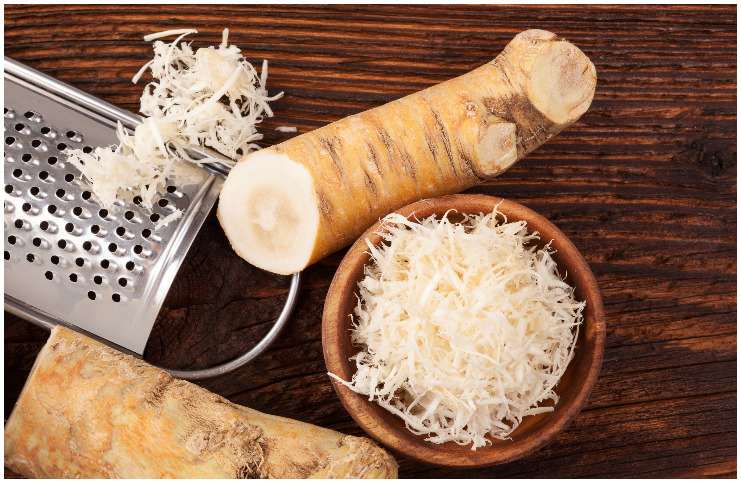Wasabi (scientific name – Wasabia japonica), also known as Namida or bergstockrose, is an edible plant member of the Cruciferae family, that also includes turnips, cabbage, mustard, broccoli, and watercress.
It grows in moist and streams and is native to Japan (dates back to at least the 10th century). In the present day, it is also cultivated in North America, particularly in British Columbia.
It has a strong, spicy taste that dissipates within a few seconds and leaves no burning aftertaste. Its hotness is different than the taste of capsaicin (the chemical usually found in chili peppers which gives them their spicy and hot flavor) because it is not oil-based.
Nutrition Facts
It is a good source of dietary fiber, vitamin C, protein, manganese, fat, potassium, magnesium, calcium, vitamin B6, thiamine, zinc, phosphorus, copper, riboflavin, vitamin B9, iron, and niacin. Also, allyl isothiocyanate is the compound found in this vegetable, which is responsible for its odor.
Health Benefits
Anti-Cancer Properties
It contains isothiocyanates, compounds that block the enzymes which inhibit the spread and development of leukemia cancer cells, according to a 2002 study. Also, these plant chemicals enable the liver to neutralize better some harmful compounds that travel throughout the human body and possibly leading to cancer.
Boosts Immunity
This vegetable is a remarkable source of vitamin C (about 41.9 mg per 100 g). Consuming a tsp every day is an easy method to make sure you get sufficient vitamin C in the diet. This is an essential vitamin since the body can’t produce it. Vitamin C also boosts the immune system.
In addition, vitamin C is a common ingredient in most anti-aging lotions, creams, and serums for improving and preventing the appearance of wrinkles and lines due to the fact that it assists in the production of collagen.
Reduces LDL and Total Cholesterol
It is rich in dietary fiber (7,8g/100g), the indigestible portion of food that is only found in plants. Fiber is an important nutrient for normal bowel movements because it increases the size and weight of the bowel. Furthermore, dietary fiber is an essential component of regular nutrition since it lowers total and LDL cholesterol levels, according to a 2015 study.
Also, consuming foods rich in fiber lowers the risk of death from any cause, as per a study issued in the Archives of Internal Medicine.
Side Effects
This vegetable has no side effects, however, it should be consumed with caution by sufferers taking agents metabolized by the liver, cancer patients, or people with coagulation disorders.
Horseradish
It is native to western Asia and eastern Europe, and a member of the Brassicaceae family, meaning that it is closely related to cabbage, mustard, and broccoli. Its scientific name is Armoracia rusticana.
In the present day, it is cultivated mainly for its edible root in the United States, India, and Europe.
Nutrition Facts
This root contains potassium, sodium, iron, manganese, zinc, copper, protein, dietary fiber, fat, folate, pyridoxine, pantothenic acid, riboflavin, vitamin A, thiamin, vitamin C, calcium, and magnesium.
Sinigrin and glucosinolate are additional chemoprotective compounds in this vegetable that increase the liver’s capacity to detoxify harmful compounds as well as it may suppress the growth of tumors. Also, the glucosinolates found in this spicy-root may assist in the elimination of free radicals, which can increase the risk of numerous chronic diseases.
Health Benefits
Boosts the Immune System
It has a high content of vitamin C, a powerful antioxidant useful in treating viral infections and enhancing immunity. Free radicals can do significant damage to the human body, but having a regular nutrition rich in foods with high antioxidant content can help prevent free radical damage.
Cancer Prevention
This root is an excellent source of glucosinolates, compounds that can stop cancer cells from dividing, according to a study issued in the “European Journal of Nutrition.”
UTIs
This vegetable promotes the increase of urine flow as well as it has mild antibiotic properties that help kill the bacteria which actually cause urinary tract infections.
Side Effects
This vegetable is likely safe, however, it is not recommended to be used during pregnancy and breastfeeding, and for children younger than 4 years. Also, it is not recommended for patients with kidney impairment or ulcers.
Wasabi vs Horseradish – Which Has A Better Nutritional Profile?
Both have compounds that can fight off a variety of chronic conditions, however, wasabi has a superior nutritional profile.
Image credit – Shutterstock
READ MORE: Honeydew Melon – Side Effects
